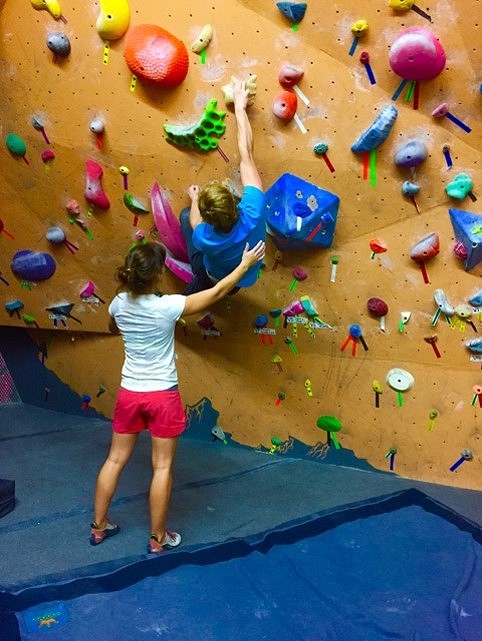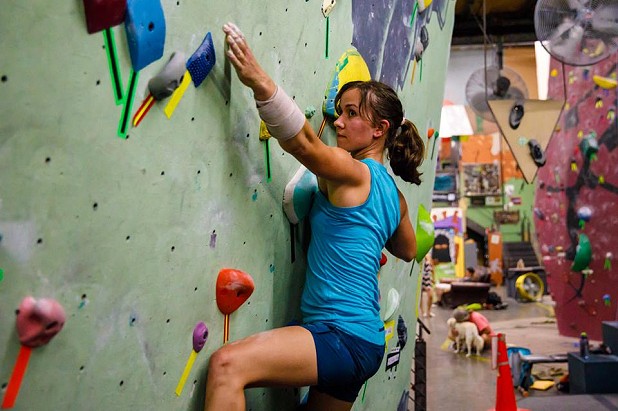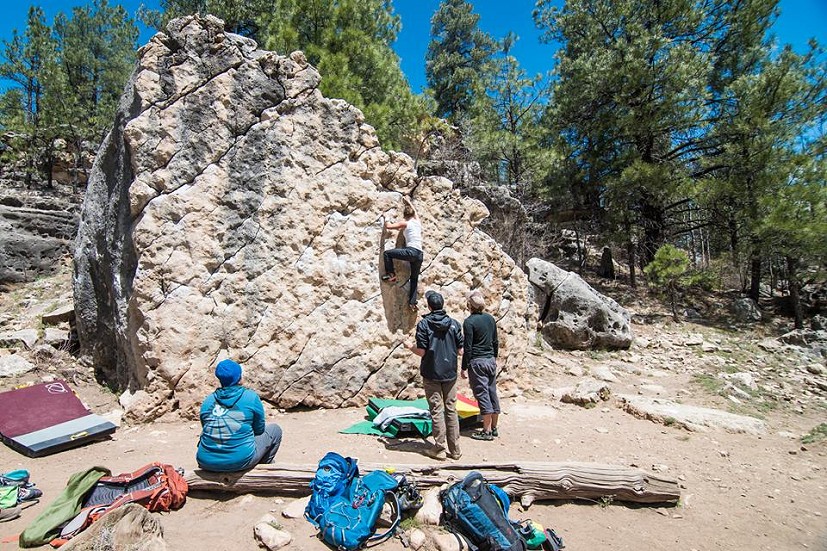
A recent study by the University of Arizona suggests that bouldering could be an effective treatment for depression in adults. Climber and researcher Eva-Maria Stelzer and her colleagues discovered that the physical, mental and social elements of bouldering successfully alleviated symptoms of depression and acted as a form of psychotherapy.
Although the feel-good factor of bouldering and 'climbing therapy' as a concept are likely nothing new to many climbers nor to us at UKC (check out our articles on climbing therapy in Germany and our Head Games: Mental Health and Climbing articles), Eva-Maria's study is one of the first of its kind and is just the beginning of a body of research that the team has in mind for assessing climbing's suitability for a variety of applications in health and wellbeing.
I sent Eva-Maria some questions to find out more about her intervention and where she sees her work heading in the future...
What is your background in climbing and bouldering?
I am an avid rock climber and boulderer. I have been climbing and bouldering for five years, both indoors and outdoors. Arizona is an amazing place with tons of outdoor climbing opportunities.
What made you come to realise the benefits of climbing for mental health, and hence consider starting the research study?
After a long day at work, my mind becomes clear and relaxed when climbing. Compared to running, for instance, climbing requires to focus on the present moment and thus I can't think about what I accomplished today, what is on my to do list etc. Since rumination is one of the biggest problems for depressed individuals, my supervisor, Katharina Luttenberger, who boulders as well, was wondering whether bouldering could be a good intervention for individuals suffering from depression. In addition, Matthias Schopper, an employee at the psychiatric hospital Erlangen, offered bouldering sessions for patients in the psychiatric day care center at the University of Erlangen prior to this scientific study. Patients enjoyed these bouldering sessions very much and told us, that they benefitted greatly. This is how this study idea developed.
How does it compare to other sports traditionally used as a form of psychotherapy?
Existing research suggests that depressed individuals benefit from physical activity. Evidence-based exercise programs associated with improved depressive scores include walking/running, aerobics, cycling, muscle strengthening, and stretching. Compared to these forms of exercise, bouldering combines aspects of mindfulness and physical activation – both components already proofed as being effective in reducing depressive symptoms. As mentioned above, bouldering requires individuals to be present in the moment and thus takes their mind off their ongoing worries. The present study promoted mindfulness by including mindfulness exercises during the intervention. Furthermore, mastering a bouldering route leads to a sense of accomplishment and feelings of self-efficacy. In addition, bouldering is a very social sport that allows individuals to interact with each other, and to give and receive feedback. When individuals engage in other types of exercise, such as running for instance, aspects such as social support, mindfulness and an immediate sense of achievement are oftentimes missing.
Which aspects of mental health were assessed in the study - what illnesses were participants suffering from?
The present study focused on the effects of a short-term bouldering psychotherapy on symptoms of depression. To be included in the study a diagnosis of depression/ a score of less than 13 points on the WHO depression scale was required. Individuals who were currently hospitalised were excluded. While the study focused primarily on the effects on depression, we measured additional outcomes, such as anxiety, coping skills, attention, and interpersonal skills.

Can you explain how the study ran?
Participants were assigned to either intervention or waitlist group. The only difference between the intervention and the waitlist group is that the intervention group started the bouldering intervention right away, while the waitlist group started bouldering eight weeks later (so the groups switched).
The bouldering psychotherapy intervention took place in a group format with about 12 participants in each group. Participants met once a week over eight weeks. Sessions lasted for 3 hours and all sessions were supervised by two mental health therapists who are experienced and certified climbing instructors.
Each session began with a short meditation or mindfulness exercise; then, the subject of the specific session was given (eg anxiety), followed by a short pyschoeduation on this subject (eg how to cope with anxiety). Next, subjects-related bouldering games or exercises were introduced (eg bouldering blindfolded) and participants were invited to boulder in small groups supported by the therapists and their peers. Sessions ended with another mindfulness meditation, a discussion about the session and how the experiences participants made on the climbing wall can be transferred into their daily lives.
Health outcomes were measured four times in total via questionnaires.
How did the participants feel about the bouldering sessions? Did they immediately respond well to bouldering, or were some apprehensive?
Feedback from our participants was extremely positive. The intervention provided a safe environment in which participants were able to express their insecurity, anxiety or frustration. At the beginning of the intervention, some participants expressed doubts whether they would be able to finish a route, in particular since most of our participants had no experience climbing or bouldering. After gradual exposure to routes of increasing difficulty, technique and fall training, and due to the guidance by supervising mental health and climbing therapists, and the positive encouraging feedback from their peers, participants overcame their doubts and enjoyed trying new routes. Bouldering gyms offer a variety of climbing routes ranging from very easy to difficult ones so that individuals with different levels of experience and physical fitness can boulder together – and everybody can make it up the wall and experience a sense of achievement.
By using bouldering as therapy, is there a possibility that medication can be reduced or stopped?
Existing research suggests that exercise programs are comparable to the antidepressant effects of psychotherapy and medication and superior to no treatment. We view bouldering psychotherapy as an additional treatment option to complement traditional care (rather than replacing existing treatment). Currently, less than one third of individuals suffering from depression receive treatment.
Climbing as a form of therapy is already popular in Germany and has been introduced to hospitals. Do you think your study will help to get more hospitals/health services in other countries interested? Perhaps the Olympics and growing awareness of the sport will help, too!
Over the last years, climbing has become increasingly popular and this trend will continue as climbing is part of the Olympics. Scientific studies, however, play a crucial role in examining the effects of bouldering psychotherapy and to convince health care providers to implement this approach into their treatment plan. At this point, more systematic research on the effects of bouldering on aspects of mental health and its underlying mechanisms is needed to make it a viable evidence based treatment option.
Are there any complications or contraindications for using bouldering in clinical applications? To non-climbers, perhaps it could seem dangerous/too expensive to implement with the facilities required, etc?
Bouldering is regarded as a comparatively safe sport. As you mentioned, one downside is that bouldering and climbing can be expensive if individuals don't become members at their gym and have to pay for day passes and rent their shoes/chalk. Some of our participants expressed this concern and were unable to keep going to the bouldering gym once the intervention had ended. Once individuals become members and own climbing shoes, however, it is an affordable sport comparable to the cost of other gym memberships (e.g., weightlifting gyms etc.). Bouldering has the advantage that it is possible year around: While individuals can boulder outdoors in sunny weather, bouldering gyms allow them to pursue this sport both in the summer and winter. When doing this kind of research, funding is essential in order to offer bouldering psychotherapy sessions at no cost to participants.
Do you plan any further studies into bouldering/climbing and mental health?
I plan on implementing a bouldering psychotherapy intervention for bereaved adolescents. After the loss of a loved one, many adolescents struggle with complex feelings while facing additional physical, psychological or academic stressors and often a lack of social support and isolation. Bouldering psychotherapy can help process emotions, such as anxiety or fear, contributing to psychological wellbeing, promote a sense of achievement, and boost adolescents' self-esteem while experiencing social support and learning to trust others. I believe bereaved teenagers would benefit greatly from bouldering psychotherapy interventions and there is a great need to support adolescents who have lost a loved one.
My former supervisor, Dr. Katharina Luttenberger, currently runs a new bouldering study in Germany which compares bouldering to cognitive behavior therapy and a general sports intervention. This is the kind of research we need, in order to make a stronger claim for the positive relationship between bouldering and aspects of mental health.
Is there anything the climbing community can do to help spread the message about the positives of bouldering for mental health?
I believe that each individual climber can spread the word about the positive effects of bouldering on their personal well-being. In addition, the climbing community can help fund and conduct scientific studies that investigate the effects of bouldering for health. Running an intervention study is a long and often expensive endeavour, and barriers, such as finding an appropriate gym that can be rented for these climbing sessions or offering bouldering to individuals at no cost, need to be overcome to conduct a scientific study that produces reliable and valid findings.
Read our UKC article: Head Games: Mental Health and Climbing
Read our UKC article: Climbing Therapy in Europe - A Modern Medicine


















Comments